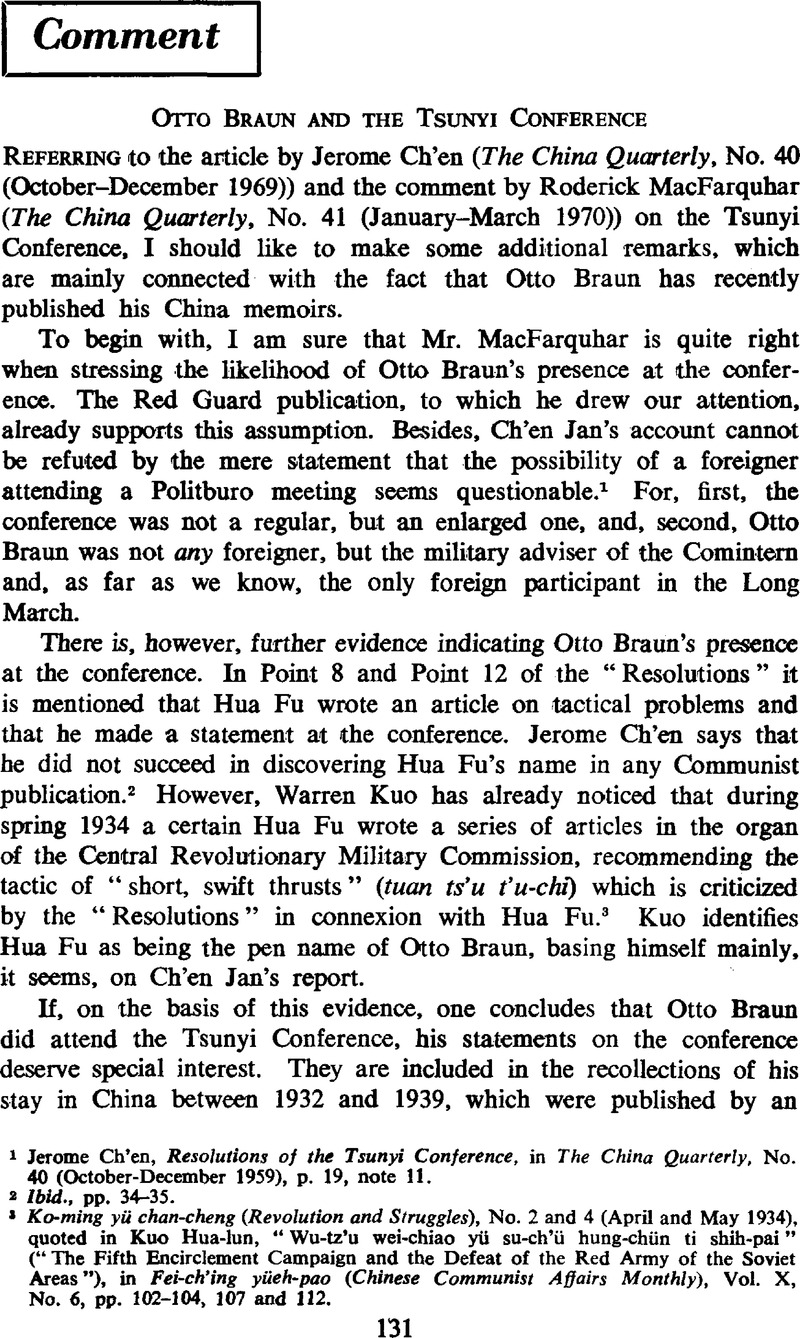Article contents
Otto Braun and the Tsunyi Conference
Published online by Cambridge University Press: 17 February 2009
Abstract

- Type
- Comment
- Information
- Copyright
- Copyright © The China Quarterly 1970
References
1 Jerome, Ch'en, Resolutions of the Tsunyi Conference, in The China Quarterly, No. 40 (10–12 1959), p. 19, note 11.Google Scholar
2 Ibid., pp. 34–35.
3 Ko-ming yü chan-cheng (Revolution and Struggles), No. 2 and 4 (04 and 05 1934)Google Scholar, quoted in Kuo, Hua-lun, “Wu-tz'u wei-chiao yü su-ch'ü hung-chün ti shih-pai” (“The Fifth Encirclement Campaign and the Defeat of the Red Army of the Soviet Areas”), in Fei-ch'ing yüeh-pao (Chinese Communist Affairs Monthly), Vol. X, No. 6, pp. 102–104, 107 and 112.Google Scholar
4 Otto Braun, “Von Schanghai bis Jaenan,” in Horizont (East Berlin) 1969, No. 23–38.Google Scholar
5 Otto Braun, loc. cit., No. 31, p. 32; No. 32, p. 32.Google Scholar
6 One of the exceptions is Henry Schwarz, who recently challenged this version. See his paper “The Nature of Leadership, A Re-evaluation of Relationships within the Political Bureau,” delivered to the Seventh International Conference on World Politics in Noordwijk, The Netherlands (September 1969), Conference Papers, Vol. I, pp. 28–31.Google Scholar
7 See Stuart, Schram, Mao Tse-tung (Penguin Books, Harmondsworth: 1966), p. 182.Google Scholar
8 The Standing Committee of the Politburo is provided for in the Party Constitution of 1928, but neither a Chairman of this Committee nor a Chairman of the Politburo, see Chung-kuo kung-ch'an-tang ti-liu-tz'u ch'uan-kuo ta-hui i-chüeh an (Resolutions of the Sixth Congress of the CCP) (n.p. or d.), p. 105.Google Scholar
9 The Party Constitution of 1928 did not provide this position, which was introduced only by the Constitution of 1945, see Chung-kuo kung-ch'an-tang tang-change (The Constitution of the CCP) (n.p., 1949), p. 14.Google Scholar
10 Tsai, Huan-wen, “China's Second Revolutionary Civil War (1927–1937),” in Highlights of Chinese History (Peking: 1962), who states on p. 87: “The meeting … elected a Central Committee headed by Mao Tse-tung.”Google Scholar
11 Ocherki istorii Kitaya v noveishee vremya (Compendium of the Contemporary History of China) (Moscow: Izdatel'stvo vostochnoi literatury, 1959), p. 262.Google Scholar
12 Kapchenko, N. I., Pekin: politika, chuzhdaya sotsializmu (Peking: A Policy being Strange to Socialism) (Moscow: Izdatel'stvo “Mezhdunarodnye otnosheniya,” 1967), p. 61.Google Scholar
13 “Korni nyneshnikh sobytii v Kitae” (“The Roots of Today's events in China”), in Kommunist (Moscow), No. 6, 04 1968, p. 105.Google Scholar
14 Radio Moscow in Chinese, 30 April 1968, as quoted by Wei, K'e-wei, “Tsun-yi hui-i chih li-shih chen-hsiang” (“The True History of the Tsunyi Conference”), in Fei-ch'ing yüeh-pao, Vol. XI, No. 8, p. 106.Google Scholar
15 Chang, Kuo-t'ao, “Wo ti hui-i” (“My Memoirs”), in Ming pao yüeh-k'an (Hong-kong), No. 48 (12 1969), p. 85.Google Scholar
16 Kuo, Hua-lun, “Tsun-yi hui-i” (“The Tsunyi Conference”), in Fei-ch'ing yüeh-pao, Vol. X, No. 7, p. 101.Google Scholar
- 10
- Cited by


